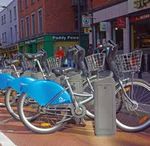CLIMATE ACTION PLAN 2023 - Changing Ireland for the Better
←
→
Page content transcription
If your browser does not render page correctly, please read the page content below
Climate action is central to Ireland’s The 2019 and 2021 Climate Action Plans saw
a big step-up in our programme of engagement
development with citizens and communities; this will
Our Climate Action Plan is integral to the continue to expand into 2023 and beyond.
National Development Plan 2021-2030. It saw us begin to overhaul our energy system,
It shows how Ireland is putting climate solutions our building sector, our food production
at the very heart of our social and economic and our transport system.
development.
Now we need to ramp up our ambition. Global
Climate Action Plan 2023 has a greater focus on emissions have continued to increase, as they
system change. We recognise that it is important have here in Ireland, so the scale of change
that the systems that shape where we live or needed to reduce them is unprecedented.
how we build, how we work or get around, how To stay ahead of the climate curve, we must
we shop or produce food do the heavy lifting. implement our plans urgently.
We need local government to change; we need
the public sector to change; we need industries
and key economic sectors to change.
Every year counts
Individuals and communities will continue to be The Climate Act 2021 and the annual Climate
key drivers of the low-carbon transition. Then Action Plans leave little room for manoeuvre.
it will be easier for people to make sustainable It is the responsibility of Ministers, key
choices that have real benefits. economic sectors, and industries to
demonstrate that they are on a clear path to
halve our emissions by 2030 and achieve net
We have to work together zero by 2050. The sectoral emissions ceilings
(SECs) agreed in July 2022 put in place targets
Delivering on this ambition will only work for each sector to achieve this.
if we all come together in a strengthened
Línte na Farraige project, Galway by Aho Niittyvirta social contract for climate action, working We have agreed the numbers. Now it’s time to
towards real solutions that are meaningful, deliver on them.
inclusive, fair and accessible. Climate action
is not all about challenges, but about realising This will mean a massive up-scaling in our
the opportunities that a clean, sustainable switch to renewables; a dramatic change to
Climate Action Plan 2023: environment and society will offer in a way our transport system and how we allocate
that is fair for everyone. Every sector, every our road space; ambitious home and business
community, every person has a role to play. retrofitting and climate-based construction,
Changing Ireland for the Better
and new innovative systems that will protect
and support our family farms to diversify their
income streams.
Change is not easy
Change is never easy, but the benefits are
We’re making progress – but we Change for the better
clear. Reducing our dependence on fossil fuel Every person matters, every place
and transitioning to our own natural resources
need to move faster is good for our collective community wealth.
matters
Inaction is not an option. We must change for
the better. We need to move at scale and at There are many exciting opportunities that arise Our approach in everything in this Plan is
The impacts and risks of climate change are
speed to ensure our country, people and planet from the transition to a carbon neutral society based on the principle of fairness, ensuring a
becoming more complex and harder to manage.
have the best possible chance, not only to and economy: new sustainable careers; warmer just transition where costs and benefits are
These impacts will be felt by all, but they won’t
survive, but to thrive. more energy-efficient homes; better travel shared equitably. We have made just transition
affect everyone equally. Here in Ireland, we
options; more sustainable consumer choice; central to our climate policy. In 2021, we
have experienced these impacts, particularly Climate Action Plan 2023 sets out our ongoing, more liveable towns and cities; cleaner air and secured €169m to ensure a just transition in
through floods and storms, and the damage urgent response to the climate crisis. It follows water; and a better environment for future the Midlands counties most affected by the
they have caused. the many milestones that have already been generations. switch away from peat as an energy source.
We are making steady progress on our climate achieved, like the start of our off-shore wind This year, we will see the establishment of the
goals, but events like these, and their expected energy programme, the roll-out of the most Just Transition Commission to ensure that no
ambitious home retrofitting scheme in Europe, community, no sector and no person gets left
increase in frequency and intensity, highlight We can be good at this
that we must work even harder to ensure the the solar rooftop revolution that is already behind.
country can cope with the ongoing effects of underway and the reduction in public transport We can be good at this, and we will be. Our
climate change. fares for the first time in 75 years. potential to be climate leaders is huge: realising
this potential must be our shared purpose.
02 Climate Action Plan 2023: Changing Ireland for the Better Climate Action Plan 2023: Changing Ireland for the Better 03The Six Vital High Impact Sectors
Turning Making family Greening
Powering Building Changing our
transport farms more business and
renewables better land use
around sustainable enterprise
75% 45% 40% 50% 25% 35%
commercial/public residential
Exact reduction
target for this
sector is yet
reduction in emissions reduction in emissions reduction in emissions reduction in emissions reduction in emissions to be determined.
by 2030 by 2030 by 2030 by 2030 by 2030
We will facilitate a large-scale We will increase the energy We will drive policies to We will support farmers to We’re changing how we The first phase of the land use
deployment of renewables that efficiency of existing buildings, reduce transport emissions by continue to produce world- produce, consume, and design review will tell us how we are
will be critical to decarbonising put in place policies to deliver improving our town, cities and class, safe and nutritious food our goods and services by using our land now. Then, we
the power sector as well as zero-emissions new builds rural planning, and by adopting while also seeking to diversify breaking the link between can map, with evidence, how it
enabling the electrification of and continue to ramp up our the Avoid-Shift-Improve income through tillage, energy fossil fuels and economic can be used most effectively to
other technologies. retrofitting programme. approach: reducing or avoiding generation and forestry. progress. Decarbonising capture and store carbon and
the need for travel, shifting industry and enterprise is key to produce better, greener food
to public transport, walking to Ireland’s economy and future and energy.
and cycling and improving the competitiveness.
energy efficiency of vehicles.
Accelerate the delivery of onshore wind, Ramp up retrofitting to 120,000 dwellings Change the way we use our road space. Significantly reduce our use of chemical Reduce clinker content in cement and Increase our annual afforestation rates
offshore wind, and solar. to BER B2 by 2025, jumping to 500,000 nitrogen as a fertilizer. substitute products with lower carbon to 8,000 hectares per annum from
by 2030. content for construction materials, 2023 onwards.
Reduce the total distance driven across all ensuring 35% reduction in emissions
Dial up to 9 GW onshore wind, 8 GW car journeys by 20%. Increase uptake of protected urea on by 2030 (against 2018).
solar, and at least 7 GW of offshore Put heat pumps into 45,000 existing grassland farms to 90-100%. Rethink our Forestry Programme and
wind by 2030 (with 2 GW earmarked for and 170,000 new dwellings by 2025, Vision. Promote forest management
green hydrogen production). up to 400,000 existing and 280,000 new Walking, cycling and public transport to Reduce fossil fuel use from 64% of final initiatives in both public and private
dwellings by 2030. account for 50% of our journeys. Increase organic farming to up to consumption (2021) to 45% by 2025 forests to increase carbon sinks and
450,000 hectares, the area of tillage to and further by 2030. stores.
Support at least 500 MW of local up to 400,000 ha.
community-based renewable energy Generation up to 0.8 TWh of district Nearly 1 in 3 private cars will be an
projects and increased levels of new heating by 2025 and up to 2.5 TWh Electric Vehicle. Increase total share of heating to Improve carbon sequestration of
micro-generation and small-scale by 2030. Expand the indigenous biomethane carbon neutral to 50-55% by 2025, up 450,000 ha of grasslands on mineral
generation. sector through anaerobic digestion, to 70-75% by 2030. soils and reduce the management
Increase walking and cycling networks. reaching up to 5.7TWh of biomethane. intensity of grasslands on 80,000 ha
of drained organic soils.
Phase out and end the use of coal and Significantly grow the circular economy
peat in electricity generation. 70% of people in rural Ireland will have Contribute to delivery of the land use and bioeconomy.
buses that provide at least 3 trips to the targets for afforestation and reduced Rehabilitate 77,600 hectares of
nearby town daily by 2030. management intensity of organic soils. peatlands.
New, dynamic Green Electricity Tariff
will be developed by 2025 to incentivise
people to use lower cost renewable
electricity at times of high wind and solar
generation.
04 Climate Action Plan 2023: Changing Ireland for the Better Climate Action Plan 2023: Changing Ireland for the Better 05Other actions Carbon pricing and cross cutting policies
Continuing to implement successive carbon tax
increases to be used for retrofitting of low-income
homes, fuel allowance and addressing fuel poverty.
Research and innovation Continue to support private finance and EIB investment
in climate projects.
National Agricultural Soil Carbon Observatory to be fully
operational.
The Marine Environment
Publish Ireland’s Five-Year Assessment Report on Climate Change.
Establish the new Maritime Area Regulatory Authority.
Implement the €65m National Challenge Fund.
Progress the mapping of all Irish offshore waters to
support all marine activities.
Governance Aerial view of Lahinch, Co Clare
Legislation for the identification, designation, and
All Climate Delivery Taskforces in operation. management of Marine Protected Areas.
Government Departments to evaluate the climate implications
of policy proposals. The Circular Economy
Whole-of-Government Circular Economy Strategy.
Just transition
Introduction of single use cup levy moving to a ban on
Implement Just Transition Framework through climate sectoral all single use plastics.
policies.
The Yeats Building, Sligo Town, Co Sligo Start deposit-return scheme for plastic bottles and cans.
Establish Just Transition Commission to advise government.
Food Waste Prevention Roadmap.
Continue targeted work in the Midlands with €169m
Just Transition Fund.
International Climate Action
Targeted social welfare measures to prevent fuel poverty.
Provide at least €225m per year in Climate Finance to
Decarbonisation of public and private local rural bus routes. developing countries by 2025.
Dublin Bikes, Dublin
Citizen engagement Adaptation
Ongoing inclusive programme of citizen and stakeholder Development of a new National Adaptation Framework
engagement to inform climate policy, improve climate literacy, (NAF) and Sectoral Adaptation Plans.
ensure transparency in decision-making, and empower people
to take climate action. Development of Ireland’s first set of standardised
climate projections that can be used across multiple
sectors to assist with adaptation planning.
Public sector
Improved availability of climate services and climate
Shandon Bridge over the River Lee, Cork City 51% reduction in GHG emissions and a 50% improvement in information through implementation of the National
public sector energy efficiency by 2023. Framework for Climate Services (NFCS).
Delivery of Local Authority Climate Action Plans. Continued mainstreaming of climate change into the
OPW’s Flood Risk management policies.
Climate related training and upskilling for public sector employees.
Improvements in the climate resilience of Ireland’s water
Full implementation of green public procurement supply infrastructure.
06 Climate Action Plan 2023: Changing Ireland for the Better Climate Action Plan 2023: Changing Ireland for the Better 07You can also read


























































